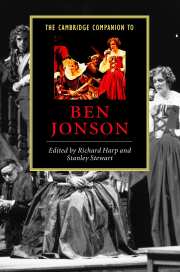Book contents
- Frontmatter
- 1 True relation
- 2 Jonson's London and its theatres
- 3 Jonson and the court
- 4 Ben Jonson and learning
- 5 Jonson's satiric styles
- 6 The major comedies
- 7 Jonson's late plays
- 8 Jonson and Shakespeare and the rhythm of verse
- 9 Jonson's poetry
- 10 Jonson and the arts
- 11 Ben Jonson's Folio of 1616
- 12 Jonson's classicism
- 13 Jonson's criticism
- 14 Jonson's critical heritage
- Bibliography
- Index
7 - Jonson's late plays
Published online by Cambridge University Press: 28 May 2006
- Frontmatter
- 1 True relation
- 2 Jonson's London and its theatres
- 3 Jonson and the court
- 4 Ben Jonson and learning
- 5 Jonson's satiric styles
- 6 The major comedies
- 7 Jonson's late plays
- 8 Jonson and Shakespeare and the rhythm of verse
- 9 Jonson's poetry
- 10 Jonson and the arts
- 11 Ben Jonson's Folio of 1616
- 12 Jonson's classicism
- 13 Jonson's criticism
- 14 Jonson's critical heritage
- Bibliography
- Index
Summary
John Dryden made what has been for centuries the definitive critical judgment on Ben Jonson's late plays, describing them as his “dotages.” Fortunately, the past few decades have seen a critical re-evaluation of these plays which has in important ways contradicted this opinion and concentrated on the merit of dramas which reiterate the important ideas of Jonson's life's work while embodying them in, for him, new dramatic modes, including the romantic drama which he had once despised. Whatever these plays were, as Martin Butler says, “they certainly were not 'dotages.'”
The Staple of News, the earliest of the dramas to be considered here, was performed in 1626 by the King's Men, first at court and then on the public stage; it was printed in 1631. It was Jonson's first play since The Devil Is An Ass in 1616, although he had been busy during these ten years in the production of thirteen masques. It was also his first play after the coronation of King Charles I, with whom he was not to have the close relationship that he had enjoyed with Charles' father, James.
- Type
- Chapter
- Information
- The Cambridge Companion to Ben Jonson , pp. 90 - 102Publisher: Cambridge University PressPrint publication year: 2000
- 3
- Cited by



